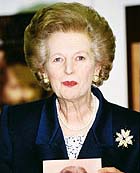
In my view, Lady Thatcher’s approach to the environment is as deeply connected to her belief in the importance of the free market as it is to her belief in tradition and our shared inheritance. She has been consistent in her belief that when the two come into conflict, we should not be blinded by our love of the latter into sacrificing the former. This became all the more apparent to her as she realized the real motives of some of her initial allies.
As Thatcher explains in her autobiography’s first volume, The Downing Street Years (1993), she “always drew a clear distinction” between different sorts of environmental concerns (638-39). Many were primarily local concerns that she believed could be addressed through the privatization of badly run municipal services. She also inherited state-run programs that she saw through to success, including the cleanup of Britain’s rivers (although the hugely successful private cleanup of London’s River Wandle shows that those programs could well have been run privately).
Then came concerns about land use and overdevelopment. On this subject she stood close behind one of her chief political allies, her secretary of state for the environment, Nicholas Ridley. As she summed up the issue: “If people were to be able to afford houses there must be sufficient amounts of building land available. Tighter planning meant less development land and fewer opportunities for home ownership” (638). (She also supported Ridley against what she called the “romantics and cranks” of the “environmental lobby” [758].)
Yet Thatcher saw traditional environmental concerns as very different from “the quite separate question of atmospheric pollution.” There her background as the only major world leader to be a trained scientist drove her approach. As she said: “There had always to be a sound scientific base on which to build–and of course a clear estimation of the cost in terms of public expenditure and economic growth foregone–if one was not going to be thrust into the kind of a “green socialism’ which the Left were eager to promote” (639).
This issue was complicated by the nature of British science funding. Prior to Thatcher’s intervention, most government science funding supported industry, which engaged in extensive lobbying. But she thought that industry should pay for research and development, and directed government science funds to universities and scientific institutes.
In her latest book, Statecraft (2002, 449-58), Thatcher devotes ten pages to the subject of “Hot Air and Global Warming.” Thatcher is quite clear that she feels things have gone in the wrong direction since former British ambassador to the United Nations-turned-global-warming- campaigner Sir Crispin Tickell convinced her to tell the Royal Society, “it is possible . . . we have unwittingly begun a massive experiment with the system of this planet itself.” She notes that the doomsters’ favorite subject today is climate change, which “provides a marvelous excuse for worldwide, supra-national socialism” (449).
Thatcher’s critics might claim that she has–to use a fashionable term–flip-flopped on the issue, but that is not necessarily the case.
First, she stresses that she was initially skeptical of the arguments about global warming, although she thought they deserved to be treated seriously. She points out that there was “rather little scientific advice available to political leaders from those experts who were doubtful of the global warming thesis” (451). However, by 1990, she had begun to recognize that the issue was being used as a Trojan horse by anti-capitalist forces. That is why she took pains in her Royal Society speech in 1990 to state: “Whatever international action we agree upon to deal with environmental problems, we must enable our economies to grow and develop, because without growth you cannot generate the wealth required to pay for the protection of the environment” (452). In fact, Thatcher makes it clear that she regards global warming less as an “environmental” threat and more as a challenge to human ingenuity that should be grouped with challenges such as AIDS, animal health, and genetically modified foods. In her estimation,
All require first-rate research, mature evaluation and then the appropriate response. But no more than these does climate change mean the end of the world; and it must not either mean the end of free-enterprise capitalism. (457)
As Tracy Mehan implies, Thatcher’s environmentalism is founded on Edmund Burke’s conservative view of our inheritance as being worth defending. Yet that view is tempered by her classical liberal belief that human wealth and progress are crucial. That is why Lady Thatcher can be described as a true free market environmentalist.
REFERENCES
Thatcher, Margaret. 1993. The Downing Street Years. London: HarperCollins.
—. 2002. Statecraft. London: HarperCollins.
Iain Murray is a senior fellow at the Competitive Enterprise Institute in Washington, D.C., where he specializes in the debate over climate change and the use and abuse of science in the political process.


